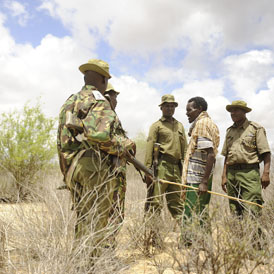Kenyan troops head into Somalia to hunt kidnap militants
As Kenyan troops enter Somalia to try and root out al-Shabaab fighters suspected of recent kidnappings, an analyst tells Channel 4 News this shows how little power the central Somali government has.

The Kenyan government has sent troops into Somalia after a spate of recent kidnappings in Kenya, which have been blamed on Somali militants from just over the border.
The Kenyan authorities believe that al-Shabaab, an al-Qaeda-linked organisation who have wrested control of much of southern and central Somalia from a weak internationally backed interim government, is behind at least some of the kidnappings.
The most recent kidnapping saw two Spanish doctors taken at gunpoint from the Dadaab refugee camp in Kenya last week.
The gunmen who took Judith Tebbutt in September from the Kiwayu coastal resort, also shot dead her husband David. In early October, a disabled French woman was snatched from the town of Lamu.
These kidnappings have been very embarrassing for the Kenyan government and so they’ve had to take some action. Analyst Hannah Waddilove
But Al-Shabab itself dismissed the kidnappings as a motivation.
“The allegations put forward by the Kenyan authorities with regard to the recent kidnappings are, at best, unfounded and, apart from the mere conjectural corroborations, not substantiated with any verifiable evidence,” an al-Shabab statement said.
Border clashes
War planes launched air strikes on two al-Shabaab bases over the weekend and Kenya moved two battalions of about 800 troops each across the border in two locations.
A Kenyan military officer based in Liboi, a border post on the frontier about 120 km (75 miles) to the west of Afmadow, said the joint military operation had driven al Shabaab from the border area.
“Our team inside Somalia is doing well. So far, we have uprooted al Shabaab from Dhobley after the air and ground raids,” said the officer, referring to the Somali district across the border.
“We are working with other friendly armed groups … to fight the common enemy, al Shabaab,” he said.
Meanwhile, al-Shabaab released a statement threatening retaliation for the incursion by Kenya.
“Your skyscrapers will be destroyed, your tourism will disappear. We shall inflict on you the same damage you inflicted on us,” Sheikh Ali Mohamud Rage said at the Mogadishu news conference.
A wider conflict?
The invasion of Somalia is the most significant foreign deployment of the Kenyan military since independence from Britain in 1963.
Sir Edward Clay, the former British High Commissioner to Kenya, told Channel 4 News that Nairobi’s move was probably “more a matter of self preservation, than as part of a wider campaign.”
“It is a potentially explosive situation as it stands but this is probably a message by Kenya to show some resolve to try to make it clear they are not going to be a sitting target for al-Shabaab,
“They will try and push al-Shabaab awary from the border as a demonstration to say its tourism is safe, but also to prove Kenyan sovereignty is safe.”
“But it is difficult. The Kenyan army has a good record, but it has never been an expeditionary force.”
Lack of credibility
Despite reports that the Transitional Federal Government (TFG) invited and are working with the Kenyan military, Hannah Waddilove, sub-Saharan analyst for the political risk firm AKE told Channel 4 News the move underlines the TFG’s own weaknesses.
“The reality is that the transitional federal government (TFG) can’t stop Kenyan forces going into Somalia.
“These kidnappings have been very embarrassing for the Kenyan government and so they’ve had to take some action.
“The TFG seriously lacks capacity and legitimacy. The southern region of Somalia is controlled by factions of al-Shabaab, the TFG have absolutely no authority there and the border is extremely porous.
“The TFG controls only a small section of Mogadishu and even then, al-Shabaab have proven their ability to infiltrate TFG areas which are supposedly secure.”
Various groups could be responsible
Kenyan media reports say troops have crossed 56 miles into Somalia to create a buffer zone and ensure the border area is clear of militants who may launch attacks in Kenya.
Kenya’s government has come under intense pressure to beef up defences of its borders and inshore waters after gunmen, thought to be allied to the rebels, seized four foreigners in a string of attacks. The al-Shabaab network has repeatedly denied responsibility.
Despite this, analyst Hannah Waddilove believes the recent kidnappings could be the work of more than one group: “Given increasing concerns that al-Shabaab has infiltrated the Dadaab camp, it’s more likely that it was responsible for the kidnappings there. However, it is also important to remember that al-Shabaab is not a cohesive movement.
“As for the others, it is possible that another renegade criminal group was responsible but that al-Shabaab definitely knew about it.
“Normally al-Shabaab claims responsibility for successes, such as the recent large bomb in Mogadishu, but it has not done that for these kidnappings. Also, these are not typical al-Shabaab tactics.”